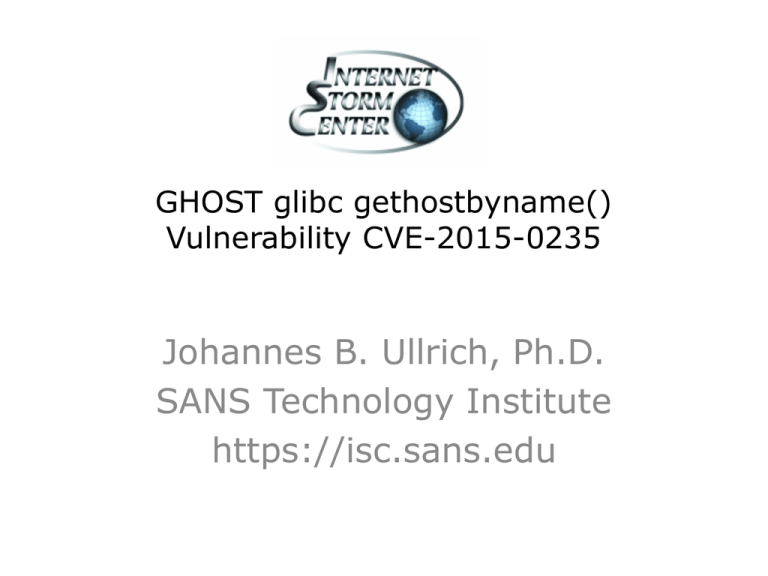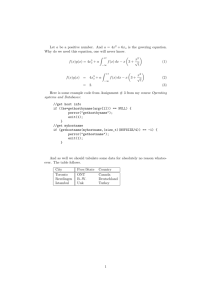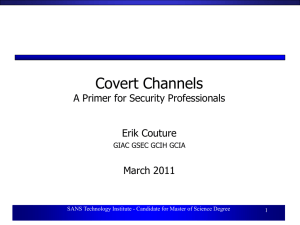PowerPoint - SANS Technology Institute
advertisement

GHOST glibc gethostbyname() Vulnerability CVE-2015-0235 Johannes B. Ullrich, Ph.D. SANS Technology Institute https://isc.sans.edu Outline • • • • • • Background: gethostbyname() Who is at risk? How to mitigate the vulnerability? How to detect the attack? Are there exploits available? How soon do I need to patch? Background: glibc and gethostbyname • glibc: GNU C Library • Part of Linux Standard Base • Available for most (all?) operating systems including Windows • gethostbyname() is an (old) standard C/POSIX function implemented by many libraries gethostbyname() • Part of Berkeley Sockets • Converts hostname to IPv4 address • Replaced by getaddrinfo(), but still widely used • Doesn’t fully support IPv6 The Vulnerability • Before converting a host name to an IP address, the function checks if the parameter is already an IP address. • The function miscalculates the size needed to store the data. • As a result, not enough memory is allocated and the buffer overflow happens Exploit • Overly large hostname consisting of numbers and up to 3 ‘.’s • Only 4 or 8 bytes can be overwritten • These bytes can only be numbers or ‘.’, making exploit development difficult Who is vulnerable • glibc 2.2 (Nov 2000) – glibc 2.17 (May 2013) • Debian 7 • Red Hat Enterprise Linux 6 & 7 • CentOS 6 & 7 • Ubuntu 12.04 (14 uses glibc 2.19) • Most BSD variants (FreeBSD, OpenBSD, OS X) are NOT vulnerable Software using gethostbyname() • Any software initiating network connections • Log processing • Mail/Spam filtering • Many servers • Exceptions: Software using the more modern getaddrinfo() function Mitigating the attack • Patch! • Patches are available for all current Linux distributions $ /lib/libc.so.6 GNU C Library stable release version 2.12, […] Compiled on a Linux 2.6.32 system on 2015-0127. • CentOS /lib/libc.so.6 • Ubuntu /usr/lib/x86_64-linuxgnu/libc.so • OS X: not installed by default, but maybe with homebrew/macports find / -name ‘libc.so*’ Detecting an Attack • Attack requires a gethostbyname() for an extraordinary long hostname that contains only numbers and up to 3 dots: 1212313.1341241234.134234.31341 (typically > 1000 digits, only numbers works too) Network Detect • You may see the lookup on the network IF the attack fails • Lookup for “A” record • Check recursive name server logs • No Snort signature as of now Likelihood of Exploit • Exploit is tricky. Only up to 8 bytes available to execute code Code can only contain digits and . • Qualys provided quite a bit of detail in its advisory, showing DoS exploits against various software • Claims to have exploit for Exim Exploit Availability • Qualys announced that they will release the Exim exploit “soon” • Expect others to work hard on exploit development • Lots of detail available • Likely some exploit going to be available this week. Summary • This is a critical vulnerability for systems using the glibc function gethostbyname() • Detection is possible but tricky • Patch affected systems THIS WEEK Thanks! Questions: jullrich@sans.edu handlers@isc.sans.edu https://isc.sans.edu/contact.html You can find a PDF and PowerPoint file for this presentation at https://isc.sans.edu/presentations











